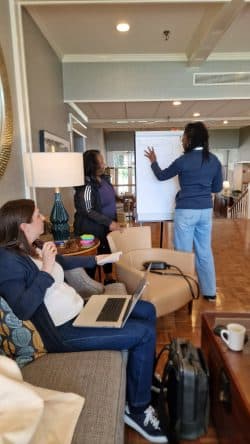Singing Justice: A Book Sprint on disrupting the canon with Black Song
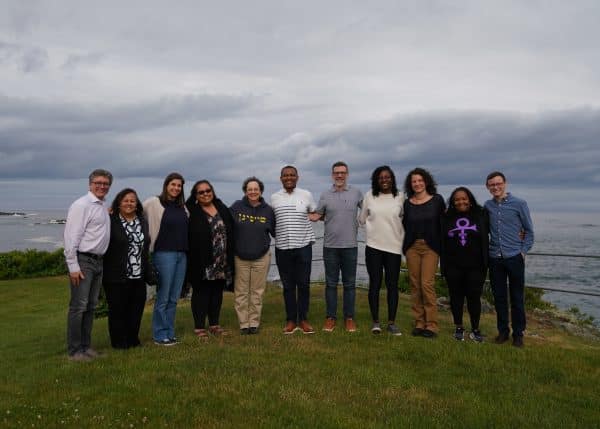
The Before Photo on Day 1 of the Book Sprint – the Singing Justice collective and Book Sprint facilitator Barbara Rühling
In June 2023, the Singing Justice Collective came together for a five-day Book Sprint. The Book Sprint was the culmination of their two-year long project of thinking through, learning about, and teaching Black Song. Hosted by the University of Michigan Humanities Collaboratory, the collective consists of a fabulous team of researchers, performers, and educators.
This is the second Book Sprint with a group from the Humanities Collaboratory. The first one with Precarity Lab group resulted in the successful book “Technoprecarious” published by MIT Press and Penguin Press.
This time, the Singing Justice group crafted a 50.000-word manuscript through in-depth exploration, dynamic discussions, and wholehearted collaboration. The forthcoming book will engage scholars, performers, educators, and enthusiasts alike. It aims at disrupting the canon taught in music programs, empowering performers and educators, and fostering empathy and humanity through Black Song.
In the weeks after the Book Sprint, the team has been reviewing the manuscript for final refinements. They plan to expand the collection of song biographies, engage potential publishers, and develop a website to accompany the book. This website will showcase the book, song biographies, visual materials, and song recordings.
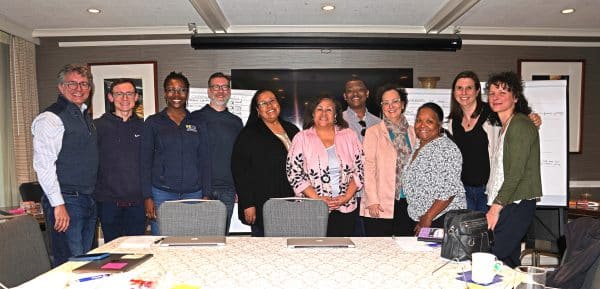
The After Photo at the end of Day 5 – accomplished and exhausted.
Singing Justice in their own words: a quote from the first chapter
“We invite you to consider Black Song as a series of practices and a philosophy for interacting with music. Black Song is an act of musical creation and performance that emerges from Black experiences, affirms Black humanity, and connects to Black communities.
There is no musical practice in which Black artists have not participated. Black Song includes them all.
Over the course of the research of the Singing Justice Collective, we have established a set of goals of what Black Song can do in a larger dialogue of race and music in the United States. As a collective, we would like to give Black Song its proper place as the foundation of American music and as a product of the Black experience.
Black Song is a powerful tool to question, disrupt, and renovate the canon generally in American music studies and music studies. The hierarchy that this white supremacist system maintains is toxic to the industry and education of music because it excludes important Black-created music that listeners across the globe consume daily. Because of music’s power to foreground emotion in combination with ideas, Black Song is a vital tool to teach human empathy across barriers of understanding, such as race, historical time, and cultural identity. “
Discussing the chapter outlines and the main messages
The Book Sprint experience in Maine
The Book Sprint took place in the picturesque town of York, Maine. The location provided a serene backdrop for the intensive five-day endeavor. Hosted by the Stage Neck Inn, the writers enjoyed the hospitality and indulged in seafood, vegetarian dishes, and blueberry pies. Whether working by the fireplace, in the garden, or in the main workspace with breathtaking ocean views, the setting provided a sense of calm and spaciousness for the collaborative process.
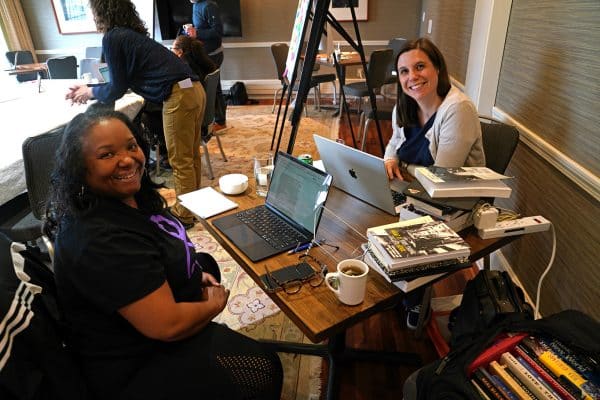
Referencing piles of books, and adding fresh thoughts to the pages
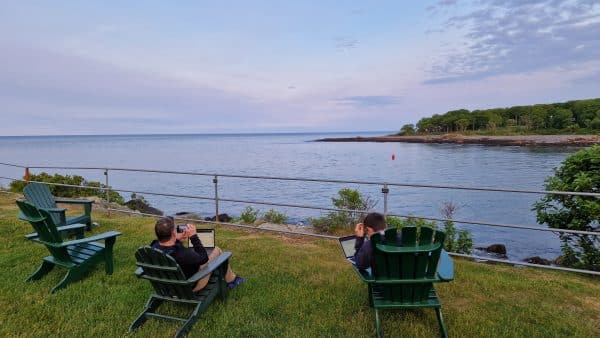
Finding space for thought and expansion
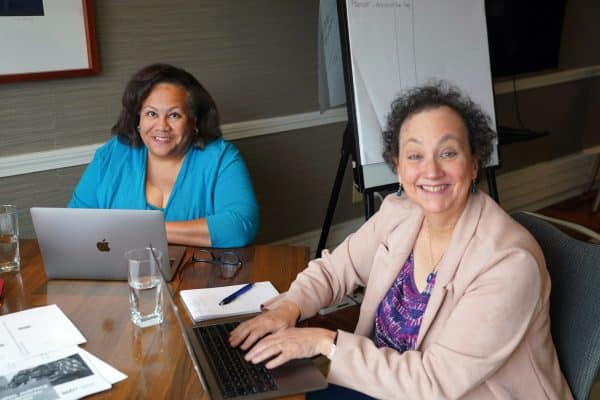
Advancing the curriculum of performers and teachers with innovative formats
The Book Sprint was facilitated by Barbara Rühling. Book Sprints’ remote copy editors Raewyn Whyte and Christine Davis refined the growing text each night. And each morning, they offered feedback on readability and rhythm.

Discussing how Black Song is related to the history of protest and activism
It paid off that the group had been meeting for two years on a weekly basis. Prior to the Book Sprint, they worked together on developing the innovative performative and educational format of Seminar Recitals. They performed together, hosted international conferences and attended others. Over this two-year period, they created a level of trust and companionship. This showed in the respectful ways the group shared their wisdom, humor, and vulnerability throughout the intense five-day process.
The resulting book: 50.000 words, 7 chapters, 9 case studies, 11 song biographies
During the five-day Book Sprint, the writers worked day and night and conceptualised, drafted, and edited a comprehensive, 50.000-word manuscript. It includes seven chapters that expand the knowledge of music enthusiasts, advance theoretical debates, and offer practical tools. The manuscript also includes nine case studies around concrete events, workshops, databases, and lessons learned by the members. Lastly, the book includes eleven song biographies. These tell stories of emblematic, often lesser known songs, from musical genres such as Spirituals, hip hop, opera, jazz, blues, funk, and more.
The draft chapter titles are:
1: Black Song: An Invitation to a More Just Musical Culture
2: Black Song Spaces
3: Black Song as Protest and Activism
4: Historical Contexts: Listening to Music and Hearing History
5: Black Song and the Problem of Music’s Classical Canon
6: Engaging with Black Song: Seminar Recitals
7: Black Song as an Anti-racist Tool for Teaching and Learning
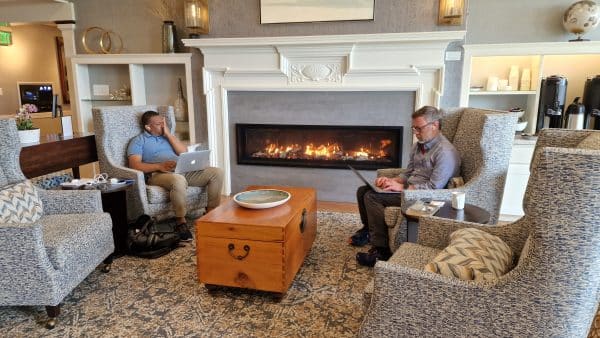
Working by the fire during cold Maine days
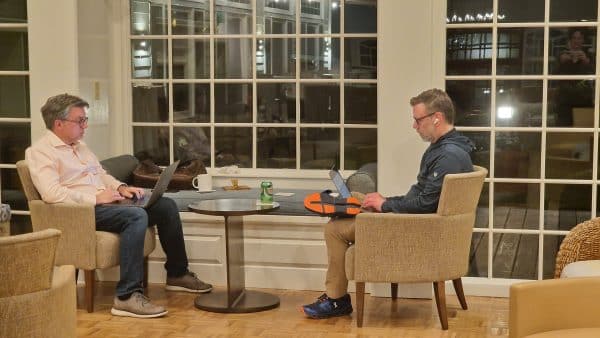
Writing and editing into the night
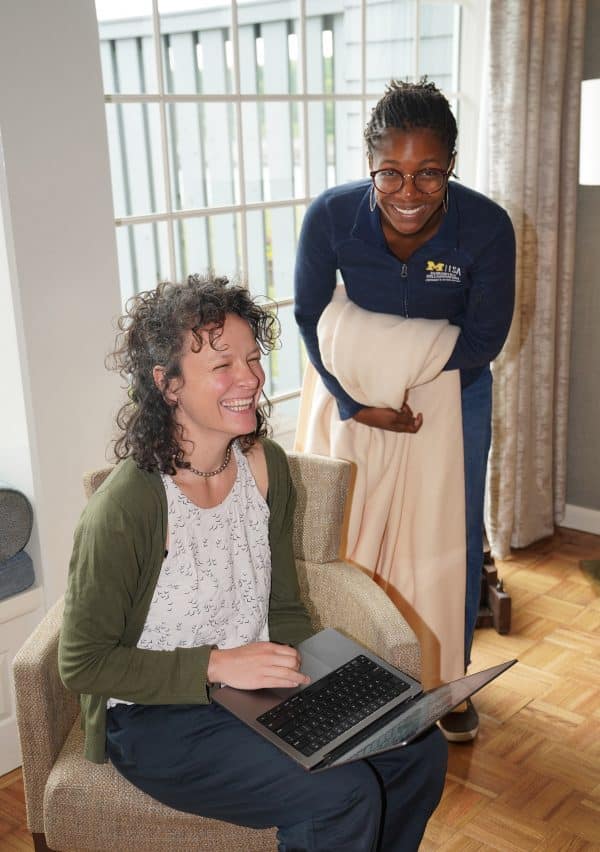
Laughing and learning throughout the process
Stay tuned for the publication of the book!
And see more photos of the process taken by Barbara Rühling and Mark Clague here on flickr.

